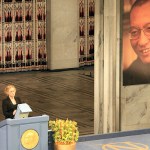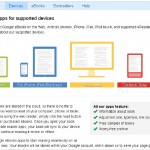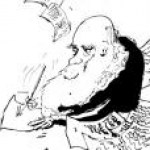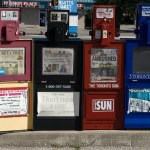education
A while back, ERV wrote about a rather silly study trying to equate viruses with obesity. I don't have anything to add to that, but I mention it because in that post, she linked to William M Briggs. He seemed to have a pretty good take on that study, and since I wasn't reading any other blogs by statisticians (and know fairly little about statistics), I added the blog to my RSS feed. It soon became abundantly clear that he and I do not see eye to eye on most issues; he seems very conservative, doesn't have a very high opinion of science, and might be a global warming denier (he never comes…
If you've had your head in the sand for the last 2 weeks, you might have missed the story about arsenic in bacteria and the resulting controversy. If you did go read Ed Yong first.
In an editorial published today in Nature, the editors make a similar point to the one I made yesterday, namely that it's hypocritical for the authors of this paper to parade their research in front of the media to great fanfare, and then refuse to respond to legitimate criticism in the media.
In response to the arsenic bacterium claims, bloggers and researchers raised serious and thoughtful reservations about the…
In education circles, the education 'reformers' based on the recent release of the international PISA results, which placed the U.S. in the middle of the pack (as one might expect, high performing U.S. states did well). Needless to say, 'reformers' worked themselves into high dudgeon: one commentator even referred to these results as the new Sputnik. The city of Shanghai was the best in the world. Modern day Paul Reveres mounted up and cried, "The Chinese are coming, the Chinese are coming!" AAIIIEEE!!! Cry "Havoc!" and let slip the dogs of Sputnik!
Let's leave aside the methodological…
NBC photo
Contestants on NBC's "Biggest Loser"
In Woody Allen’s Sleeper, Miles awakens after a 200-year sleep, to a world in which healthy food choices have become topsy-turvy:
Dr. Melik: (listing items Miles had requested for breakfast): "... wheat germ, organic honey, and... Tiger's Milk."
Dr. Aragon: "Oh, yes. Those are the charmed substances that some years ago were thought to contain life-preserving properties."
Dr. Melik: "You mean there was no deep fat? No steak or cream pies or... hot fudge?"
Dr. Aragon: "Those were thought to be unhealthy... precisely the opposite of what we now know…
In last week's editorial in Science, Bruce Alberts starts with a point that I think few here would disagree with: decisions in government need to be data-driven, and based on the best science available. This point has been made before, and it's certainly crucial, but the more crucial point is why the government currently doesn't pay much attention to science, and why there is wide-spread misunderstanding of what science means.
Most Americans have never met a scientist, and despite having been "taught science" at school, most have no real idea of how a scientific consensus is reached through…
Diptheria vaccinations in the 1920s
The town of Leicester was a particular hotbed of anti vaccine activity and the site of many anti-vaccine rallies. The local paper described the details of a rally: "An escort was formed, preceded by a banner, to escort a young mother and two men, all of whom had resolved to give themselves up to the police and undergo imprisonment in preference to having their children vaccinated...The three were attended by a numerous crowd...three hearty cheers were given for them, which were renewed with increased vigor as they entered the doors of the police cells."…
The ceremony of Liu Xiaobo's Nobel Peace Prize was filled with symbolism, as the award was placed in an empty chair as the recipient remained in prison for, as some say, expressing his civil rights. Liu Xiaobo embodies the pursuit of freedom within a communist system that by definition constrains personal freedom and realization of personal achievement. As I listened to coverage by PBS's NewsHour, the role of technology in the realization of human rights came into focus. While the Chinese government "blocked television coverage of the event and clamped down on Internet communications…
This is a powerful portrayal of how we have used Google to access information, summarized for 2010 in less than three minutes. I simply had to share this with ScienceBlogs readers, with acknowledgement from Mashable.
From the Mashable article:
"In terms of news searches, Haiti proved the most popular, followed by Turkish sports club Besiktas, Chile, "earthquake," Lady Gaga and the iPhone 4. The Gulf of Mexico oil spill ranked 10th."
Funny - that covers several topics that captured my attention! Our imaginations have become engaged in a digital world changing at an incredible rate - I can…
This video from the University of Minnesota's Institute on the Environment is like a conservationist's version of the "Right Here, Right Now" video about social media (although the music isn't as good). It has crisp design, good infographics, and makes a very important point: that nature has massive, unappreciated economic value.
I'm not saying that money should be the main reason for environmental protection; I value nature for purely aesthetic and scientific reasons, over and above economics (although aesthetics and science both have economic value - realized through tourism and R&D).…
Sorry for the radio silence on my part lately. My house got broken into... again... and I'm dealing with the fallout.
I'm thinking about a post on knowledge, where it comes from, what it's good for and if it matters. But before I write it, I'd like to get your input.
What do you think "knowledge" is? Is it different than Truth?
Do you agree with the idea, "Ignorance is Bliss"? Is it ever? What about, "Where ignorance is bliss, 'tis folly to be wise?"
What does it mean to be wrong?
Google announced yesterday that you can now access three million books from 4,000 publishers from their ebookstore. These eBooks can be read on an android, iPhone, iPad, iTouch, Nook and Sony bookreaders and - almost forgot - a computer.
With this announcement, I wanted to share with ScienceBlogs readers an Op-Ed I published this Spring that discusses what we might be missing if electronic media were to replace printed media. What do you think? Please share your thoughts.
Electronic books, like it or not, may eventually replace books in print. Borders launched an e-book store with more…
Anyone wanting to learn about Darwin's theories would do well to read his original letters. Thanks to an amazing resource from the University of Cambridge, the "Darwin Correspondence Project", you can access a treasure trove of his letters in an interactive timeline.
This resource addresses:
Darwin and Science
Darwin and Religion
Darwin and Ecology
Darwin and Gender
Darwin and Geology
Darwin and Human Nature
Enjoy the feast!
Typical letters exchanged by Darwin and his closest friend, Joseph Dalton Hooker (© Cambridge University Library)
Thanks, Karen James, for the tip!
As a member of the American Diabetes Association, I attended the ADA annual meeting several years ago and heard an inspiring lecture by Prof. Gene Barrett (Univerrsity of Virginia). Dr. Barrett delivered that year's President's Address titled: "The Sheep, the Ostrich, the Ant, Diabetes, and the Tragedy of the Common". {You can read the published article from this address here.}
As Dr. Barrett explained, the "tragedy of the Common" can be described as follows:
"Therein is the tragedy. Each man is locked into a system that compels him to increase his herd without limit - in a world that…
With the virtues that online social networking may offer for education, a thought for today is to consider a strategy to give yourself a respite from the frantic, nonstop pace of Facebook, Twitter, Digg and any other virtual world that sucks you in. A curious new software (counterculture?) called "Anti-Social*" has emerged that offers the user this:
"You'll choose an allotment of time for Anti-Social to block your access to sites like Twitter, Facebook, Digg and whatever else you deem distracting (LOLdawgz.org), decide whether you'll need access to your email, and then start the fade to…
As a scientist and educator, I had never planned on playing the role of a science journalist. That role was approached with caution step by step, on mental tiptoe, first with publishing Letters to the Editor in The New York Times, progressing inexorably towards Op-Eds and Blogs, propelled by a joy of writing and the desire to explain the importance of science in our daily lives.
Everyone seems to have access to the megaphone of the press previously available only to a cloistered club of journalists. My goal was not to add an idiosyncratic opinion or to criticize -- of which there is no…
Every year the Globe publishes a gift book guide separate from their regular list of notable books. Great for coffee table style books for that special someone. The list has a few non-science items that look particularly cool to me so I'll list those too. (Note that the online version is missing most of the books mentioned in the print version.)
The Native Trees of Canada By Leanne Shapton
Self Sufficiency for the 21st Century by Dick and James Strawbridge
Atlas of the World by Oxford University Press
Explorers: Great Tales of Adventure and Endurance by the Royal Geographical Society
The…
I've discussed before how our political discourse shouldn't be the sole purview of English majors, that some topics might gain from being covered by those who have some mathematical training (quite a few science journalists do have this, and are quite good at reporting 'quantitative' stories). A reader sends us a link to this column by Washington Post ombudsman* Andrew Alexander about the problem of mathematical illiteracy among journalists. I often get some pushback on the whole English major thing, so it was refreshing to read this:
"We are, more or less, an industry of English majors,"…
As usual, lots of terrific articles are included in this issue. More and more, I wonder why a scitech librarian would publish their articles anywhere else, especially in a toll access journal.
Old Words, New Meanings: A Study of Trends in Science Librarian Job Ads by Brenna K.H. Bychowski, Carolyn M. Caffrey, Mia C. Costa, Angela D. Moore, Jessamyn Sudhakaran, and Yuening Zhang, Indiana University
Increasing the Visibility of the Library within the Academic Research Enterprise by Annette M. Healy, Wayne State Universitty
Science Seeker: A New Model for Teaching Information Literacy to Entry…
The JCC, where SteelyKid goes to day care, is having a book sale, so the lobby has been full of books for sale the last few days as we've headed out. Getting SteelyKid away from the books is pretty difficult, as you would expect from our daughter.
We've mostly avoided getting anything, but yesterday, I caved and bought the Curious George board book with pull-out flaps that she latched onto. Why? This page:
The book is a collection of pages showing various places George goes to be curious, and has pull-out tabs showing a person associated with the place, and a thing associated with the place…
ejbSF's Flickr photostream
My office is often a flurry of activity with students coming with a wide array of questions. Whenever possible, I respond to their questions via email. Last Fall, one of our students expressed dismay when I told her I would respond to her request with an email.
"Email, Dr. Toney? That's so old fashioned."
After some thought, I realized she was right. After all, I sent my first email message sometime before the class of 2014 was born (in the early to mid 1990's), so it should be no surprise that this form of communication could be seen as quaint.
It is…





